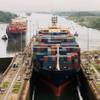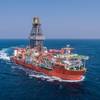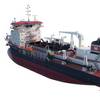In the new global economy where interconnectivity and interdependency are key factors, sea transport remains by far the most cost-effective way to move goods and raw materials in quantity around our planet and the vast majority of world trade is carried in ships.
The seafarer - the human factor that operates at the cutting edge of sea transportation - is therefore a vital component of globalization, said Mr. William A. O'Neil, Secretary-General of the International Maritime Organization (IMO), in his annual World Maritime Day message today (27 September 2001).
“The United Nations, of which IMO is a specialized agency, has been considering the challenges that globalization poses both for the people of the world and for the UN system itself. The central premise being addressed in this context is how to ensure that globalization becomes a positive force for all the world’s people, and not for just a privileged few.
“Twice a year, the heads of all the United Nations agencies meet to discuss the most important issues from a worldwide perspective, and globalization has been high on the agenda for some time. At the meeting in April this year I drew attention to the role played by maritime transport in underpinning the new global economy and to the direct contribution it makes in terms of poverty alleviation and the economic growth of developing countries.
“In this connection, IMO’s responsibility to ensure acceptable global standards through its focus on maritime safety and prevention of marine pollution becomes even more important. Of particular significance is the protection of the marine environment, in view of the dependency of many nations on the sea as a source of food, which was also included as one of the key goals in the Millennium Declaration.
“The existence of strong transport and communication infrastructures is essential to sustainable development. Moreover, maritime activity provides an important source of invisible income to many developing countries. Indeed, developing countries now lead the world in some of shipping’s most important ancillary businesses, including the registration of ships, the supply of sea-going manpower and ship recycling. They also play a significant part in ship owning and operating, shipbuilding and repair and port services, among others.
“But, seen in a wider context, shipping has an even more important role to play in the new global economy. Sea transport remains by far the most cost-effective way to move goods and raw materials in quantity around our planet and the vast majority of world trade is carried in ships. It is hard to envisage that changing in the foreseeable future. The pressures of the global market today make the delivery of goods and materials time-dependent. The transportation industry has thus become a key component of a manufacturing sector which now sets its store by providing a complete “door-to-door” service. If the benefits of globalization are to be evenly spread, the developing countries must be knowledgeable of and able to play a full and active part in the distribution system.
“All of which makes the mariner, the human factor that operates at the cutting edge of sea transportation, a vital component of globalization. Because safety and efficiency are two sides of the same coin – by which I mean accidents are not only undesirable outcomes in themselves, but also have a negative impact on the supply chain that is the very muscle and sinew of the new global economy - at IMO, we now place human element considerations at the centre of our work to reduce shipping-related accidents and lessen their consequences.
“Our goal is to make sure that the people manning the world’s ships today are alert, motivated, educated, trained and qualified to the proper standards and in fact possess the skills necessary to perform properly. We recognize that the challenge to achieve this is a complex and multi-faceted one, but it is one to which we are firmly committed.
“At the heart of our work are two measures which cannot be overemphasized. The International Safety Management (ISM) Code and the 1995 Convention on Standards of Training, Certification and Watchkeeping for Seafarers (STCW) rank among the most important pieces of legislation to have passed through IMO in recent years. In keeping with our focus on the human element, both measures are concerned primarily with people rather than with technology. ISM deals with corporate management and sets out how shipping companies must establish effective structures that create and promote a safety culture, while STCW deals with seafarers and the standards to which they must be educated, trained and certified.
“Both are approaching key dates in their implementation schedules. In 2002, all seafarers will have to be trained in accordance with the provisions of STCW ’95 and carry certificates to that effect; and the ISM Code, already mandatory for passenger ships, tankers and high-speed craft, will be extended to all cargo ships of 500 gross tonnage and above.
“These measures will join a host of other advances in safety at sea which, particularly in relatively recent times, have been clear for all to see. Ships are now designed, built, operated and manned to standards more exacting than ever before.
“Yet despite these improvements, it remains a sad fact that several hundred people are injured or lose their lives in maritime accidents every year. Usually their injuries and deaths go largely unrecorded. For some time, I have felt that the courage, dedication and sacrifices of the seafarers who operate the ships on which the world depends, deserve to be recognized in some tangible way.
“That is why, to mark the 50th anniversary of IMO in 1998, I inaugurated a Trust Fund dedicated to the education and training of seafarers. The Fund would also be used to establish a permanent memorial to seafarers at IMO headquarters, which would act as a constant reminder of the important role they play and of what our work is really all about.
“The sculpture which will form the memorial is now progressing and will be formally unveiled on World Maritime Day this year, September 27th. It will be, I believe, a highly impressive piece of work; cast in bronze it will be the figure of a sole seafarer, standing on the prow of a ship, and altogether will be some seven metres high.
“It will be a constant reminder that, although rarely in the limelight, the maritime sector, and particularly the safe movement of goods by sea, is fundamental to this new era of globalization which affects us all and in which we all share. The part played by the seafarer in spreading the benefits of this global revolution as evenly as possible is crucial and, on this World Maritime Day, we at IMO are proud to be able to play our part in ensuring that it is properly recognized.”
Subscribe for
Maritime Reporter E-News
Maritime Reporter E-News is the maritime industry's largest circulation and most authoritative ENews Service, delivered to your Email five times per week










